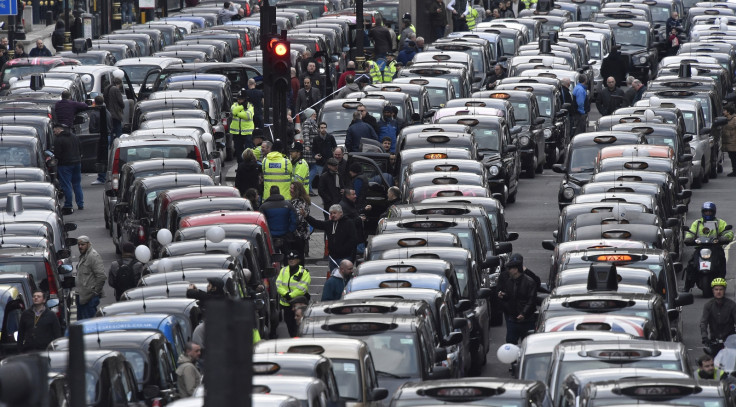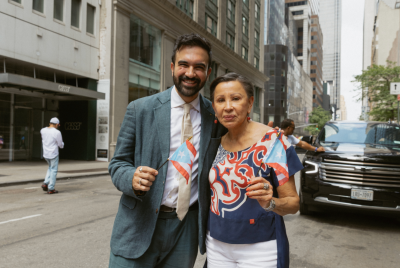Uber's vision of a 'gig economy' doesn't only exploit workers - it harms us all
When companies like Uber dodge their social security obligations the wider public loses out too.
Tyrannical bosses are no longer fat wicked men who wear top hats and slip into reveries about taking back India. Today they are more likely to unbutton their shirt collars, roll up their sleeves and wax lyrical about the benefits of diversity and saving the polar bears. They also tend quite often to be young and hip; or at least to expend a great deal of energy trying to be hip.
The so-called 'gig' economy is very much a product of this pseudo-subversive universe. The word itself summons up images of rock stardom and insouciant swagger – like an arrogant colossus bestriding the stage you can turn up to a 'gig' when it suits you. Yet rather than following the bars in the verse of a song an algorithm is your master. You may have waved away your rights to holidays, sick pay and a minimum wage – but bro, you're gigging, and in the brave new tech-utopia everyone can be a winner.
The lesson of the 'gig economy' is that the surest way to exploit a person today is to drown them in a giant deluge of newspeak. Modern corporatese mimics 20th-century communism in its fondness for worthless euphemism. At big multinationals like Amazon workers are not called workers at all, but are instead referred to by the company as 'Associates'. You are all Associates - workers and Amazon's CEO Jeff Bezos alike.
Never mind that Bezos can make more money in a single morning than an Amazon order picker will earn in their entire life – the rhetoric of pseudo-equality is in. You are one big happy family. And, even if you do fall out with the company, there is a soothing rhetorical palliative to hand: you are never fired or sacked, but are instead 'released'.
Yet as the court case between the GMB union and Uber revealed on Friday, beneath the apparent abolition of the categories of boss and worker in the modern economy the old antagonisms simmer away like a hot pan of coals. A matey alliance between exploiters and exploited may exist in a jargon-laden corporate contract (that's if you even get one of those), but up against cold reality the benevolence on the part of employers very often evaporates like steam from a kettle.
When companies like Uber dodge their social security obligations the wider public loses out too.
The Central London Employment Tribunal ruled on Friday that Uber's drivers are employees rather than self-employed. As such, they are entitled to employee rights – the national living wage, annual leave as well as other benefits. Uber fought extremely hard not to give its employees the same benefits that other companies are obliged to give theirs, and it has said that it will appeal against the tribunal's decision. Already, the GMB union has accused Uber of misleading its drivers as to the result of Friday's case – it says that Uber sent an email to its 40,000 drivers on Friday saying the decision only impacts the two individuals who brought the case.

In the end the case against Uber was clear cut, despite the company's protestations. The tribunal set out 13 reasons why Uber is an employer and its staff employees, including the fact that the company interviews and recruits drives, fixes fares and subjects drivers through its ratings system to "what amounts to a performance management/disciplinary procedure". The tribunal dismissed the notion that Uber is 'a mosaic of 30,000 small businesses' linked by a common platform as "faintly ridiculous". When Uber's management spoke of the company assisting its drivers to "grow" their businesses, the tribunal poured scorn on that too, saying in response that "no driver is in a position to do anything of the kind, unless growing his business simply means spending more hours at the wheel."
Workers right across Britain's increasingly casualised economy are set to gain from Friday's ruling. Since the 2008 financial crash successive governments have put a positive spin on the rising number of Britons who are self-employed. Yet according to the Resolution Foundation, earnings for self-employed workers are typically lower than they were two decades ago. Nominally self-employed workers in the so-called gig economy also lack the protections which ordinary employees have, even though they are very often working for a single company. When companies like Uber dodge their social security obligations the wider public loses out too. By hitherto avoiding paying tax and national insurance contributions, Uber, which is worth a cool $62.5bn, has effectively been passing that cost on to the rest of us.
Like most big players in the gig economy, Uber may call themselves 'disrupters' but they are subversive only in the sense that purchasing a £3 Che Guevara zippo lighter is striking a blow against capitalism. Indeed, listening to the company's most sycophantic defenders Uber resembles a cult more than a 'self-employment platform'. During the tribunal, Judge Anthony Snelson quoted from Shakespeare's Hamlet in his damning assessment of one manager's blind loyalty to the company. "Reflecting on the respondents' general case, and on the grimly loyal evidence of [Uber regional general manager] Jo Bertram in particular, we cannot help being reminded of Queen Gertrude's most celebrated line, 'The lady doth protest too much, methinks'."
You are a worker, and are thus entitled to the same protections that other workers are entitled to
The champions of casual work riff disingenuously on words like 'choice' and 'freedom' knowing full well that for most people the 'flexible economy' is a double-edged sword. You cannot 'choose' to default on the mortgage, nor are most people 'free' to ignore the bills that continue to drop through the letterbox when they're taken ill. Uber and its fanatical supporters recall the self-serving behaviour of the free market-worshipping character Milo Minderbinder in the novel Catch 22, who justifies ripping off his comrades by ludicrously invoking the "historic right of free men to pay as much as they have to for the things they need in order to survive".
Of course, the posturing by companies like Uber as rebellious and revolutionary 'disrupters' ultimately has a wider purpose: to disrupt workers' rights. Yet Friday's victory for Yaseen Aslam, James Farrar and the GMB union sends a clear message to those toiling away in Britain's low pay economy that selling your labour to one employer for an hourly sum does not make you a 'self-employed contractor'; nor does it make you an 'associate' or 'partner'. You are a worker, and are thus entitled to the same protections that other workers are entitled to – protections which, in many instances, have been fought for tirelessly by previous generations of workers.
For all the uplifting and trendy drivel we hear from the purveyors of 'gig' capitalism, genuine freedom is usually contingent on far less glamorous formalities like employment protections and a regular income.
James Bloodworth is former editor of Left Foot Forward, one of the UK's top political blogs, and the author of The Myth of Meritocracy.
© Copyright IBTimes 2025. All rights reserved.





















